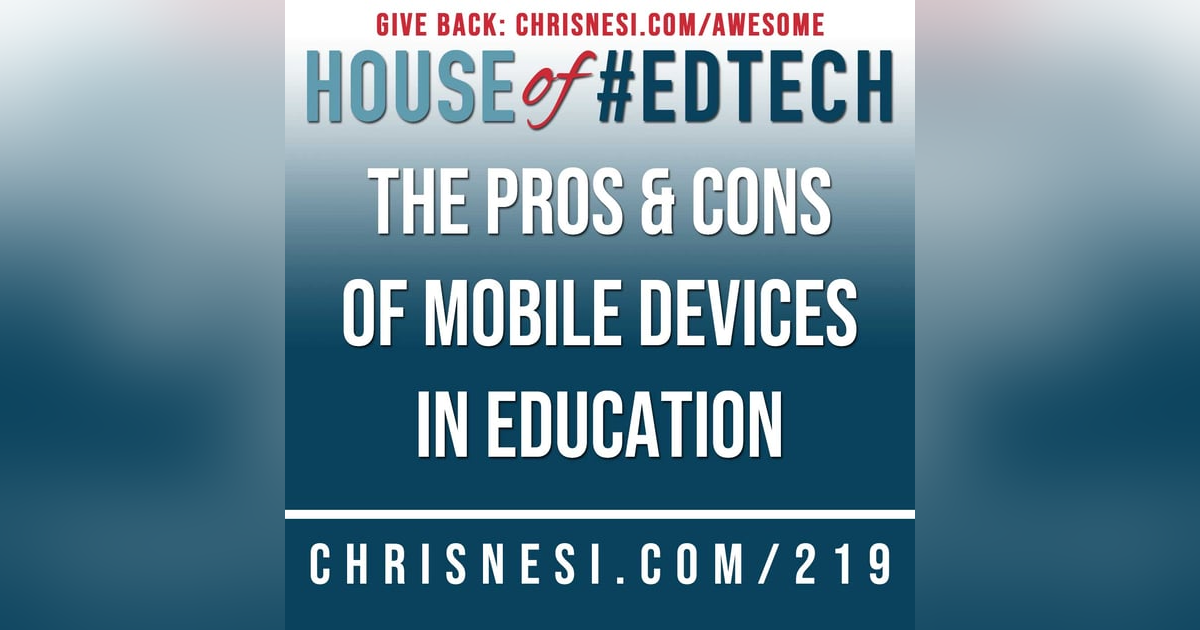The Pros and Cons of Mobile Devices in the Classroom - HoET219

Mobile devices in education - Like 'em or Spike 'em!
Feedback & Shout Outs (1:34)
I am thrilled to welcome Tech Tools for Teachers and Speaking with Students to the Education Podcast Network! These two new shows bring valuable perspectives and insights to the education community. Tech Tools for Teachers, hosted by Shanna Martin, offers practical advice and recommendations for integrating technology into the classroom. Meanwhile, Speaking with Students, hosted by Will Andresen, provides a platform for students to share their experiences and perspectives on education.
Congratulations to Mike Dodge, Sam Fecich, Chris Stuchko, Dan Gallagher, and Steve Chisnell for winning a t-shirt! I hope they enjoy wearing their shirts and spreading the word about the House of #EdTech. Thank you for your support and for being part of this community.
EdTech Thought (6:00)
My thought is a satirical critique of replacing human teachers with ChatGPT. I point out the absurdity of relying on a cold algorithm that spits out answers like a vending machine and can make witty jokes and puns. I used quotes from supposedly satisfied users of ChatGPT to highlight the negative consequences of using such a program, such as the lack of original thought and critical thinking. I end by mocking the idea of upgrading the personality of ChatGPT, implying that it is ridiculous to think that a machine can replace human teachers who can provide a personal connection and expertise.
Featured Content (8:32)
Mobile devices have become increasingly popular in education due to their ability to provide students with access to educational resources and tools anytime and anywhere. With the rise of mobile technology, students can now use their smartphones and tablets to access educational apps, e-books, online courses, and educational videos, among other resources. Mobile devices also offer teachers and professors the opportunity to provide personalized learning experiences and interactive activities that enhance student engagement.
One of the biggest advantages of mobile devices in education is their ability to promote digital literacy and 21st-century skills. Through the use of mobile technology, students can develop critical thinking, problem-solving, and collaboration skills, which are essential for success in today's workforce. Additionally, mobile devices can help bridge the digital divide by providing equal access to educational resources for students in remote or underprivileged areas. However, it is important to note that the integration of mobile devices in education should be done strategically and with proper planning to ensure that it aligns with the learning objectives and goals of the curriculum.
CLICK HERE TO GET A FREE CELL PHONE EXPECTATIONS POSTER
EdTech Recommendation (28:01)
For Elementary School:
- Duolingo - (https://www.duolingo.com/)
- Epic! - (https://www.getepic.com/)
- Prodigy Math Game - (https://www.prodigygame.com/)
- ScratchJr - (https://www.scratchjr.org/)
- Khan Academy Kids - (https://learn.khanacademy.org/khan-academy-kids/)
For Middle School:
- Quizlet - (https://quizlet.com/)
- Google Classroom - (https://classroom.google.com/)
- Photomath - (https://photomath.app/)
- iCivics - (https://www.icivics.org/)
- Grammarly Keyboard - (https://www.grammarly.com/mobile/keyboard)
For High School:
- Khan Academy - (https://www.khanacademy.org/)
- WolframAlpha - (https://www.wolframalpha.com/)
- Evernote - (https://evernote.com/)
- StudyBlue - (https://www.studyblue.com/)
- Forest - (https://www.forestapp.cc/)
ASK QUESTIONS, SHARE YOUR FEEDBACK, AND CONNECT WITH ME
- Comment on the show notes below
- Click here to leave a voicemail
- Subscribe & Follow the House of #EdTech
- Email feedback@chrisnesi.com (audio files welcome)
THANK YOU TO MY AWESOME SUPPORTERS!
CLICK HERE TO BECOME AWESOME!
- Leo Calbusch - @leocalbusch
- Bryon Carpenter - bryoncarpenter.com
- Erin Cummings - @ErinC_CCIU
- Peggy George - Classroom 2.0 LIVE
- Jeff Herb - instructionaltechtalk.com
- Matt Miller - Ditch That Textbook
CHECK OUT MORE EDUCATION PODCAST NETWORK SHOWS
SUPPORT THESE BRANDS AND COMPANIES AND YOU WILL BE SUPPORTING THE PODCAST.
DISCLOSURE
This post may contain links to products or services with which I have an affiliate relationship. I may receive commissions or bonuses from your actions on such links.

















